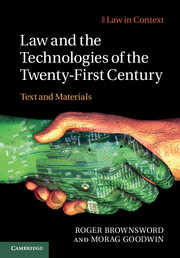Book contents
- Frontmatter
- Contents
- Acknowledgements
- Miscellaneous Frontmatter
- Abbreviations
- Table of cases
- Table of statutes and other public documents
- Part I General introduction
- Part II Regulatory prudence and precaution
- Part III Regulatory legitimacy
- 8 Key boundary-marking concepts
- 9 Human rights as boundary markers
- 10 A look at procedural legitimacy: the role of public participation in technology regulation
- Part IV Regulatory effectiveness
- Part V Regulatory connection
- Concluding overview
- Index
- References
10 - A look at procedural legitimacy: the role of public participation in technology regulation
Published online by Cambridge University Press: 05 August 2012
- Frontmatter
- Contents
- Acknowledgements
- Miscellaneous Frontmatter
- Abbreviations
- Table of cases
- Table of statutes and other public documents
- Part I General introduction
- Part II Regulatory prudence and precaution
- Part III Regulatory legitimacy
- 8 Key boundary-marking concepts
- 9 Human rights as boundary markers
- 10 A look at procedural legitimacy: the role of public participation in technology regulation
- Part IV Regulatory effectiveness
- Part V Regulatory connection
- Concluding overview
- Index
- References
Summary
Introduction
At the site of the Soldiers’ National Cemetery in Gettysburg, Pennsylvania, in 1863, in a ceremony commemorating the sacrifice of Union soldiers in the ongoing American Civil War, Abraham Lincoln delivered what has come to be known as the Gettysburg Address. In this powerful and eloquent statement, Lincoln sought to strengthen the resolve of those still alive to protect the achievements of the American Revolution, notably ‘government of the people, by the people, for the people’. As this famous phrase from one of the most well-known political speeches in history so succinctly captures, procedure lays at the heart of what we understand political legitimacy to be.
While boundary markers – such as respect for human rights, human dignity or the environment – function to set substantive limits on the acceptable outcomes of regulatory deliberations, the decision of regulators to stay within such boundaries is not itself sufficient to legitimise the regulatory outcome. Discussions about what markers are relevant and where they should be located take place in a broader process of decision-making, in which other standards or markers of legitimacy are relevant. If substantive legitimacy concerns itself with questions of ‘what’ – of what decisions can legitimately be made, procedural legitimacy focuses on the ‘who’ and the ‘how’. Not only, therefore, does the procedural frame need to be in place before issues of substance can be determined, we need to agree that the frame is legitimate. In other words, even if a regulatory decision cannot be criticised as illegitimate relative to one of the substantive boundary markers, it might still fail to pass muster relative to the requirements of procedural legitimacy. We focus in this chapter on the questions of ‘who’ and ‘how’, and suggest that public participation has become a key requirement of procedural legitimacy.
- Type
- Chapter
- Information
- Law and the Technologies of the Twenty-First CenturyText and Materials, pp. 246 - 268Publisher: Cambridge University PressPrint publication year: 2012
References
- 1
- Cited by



